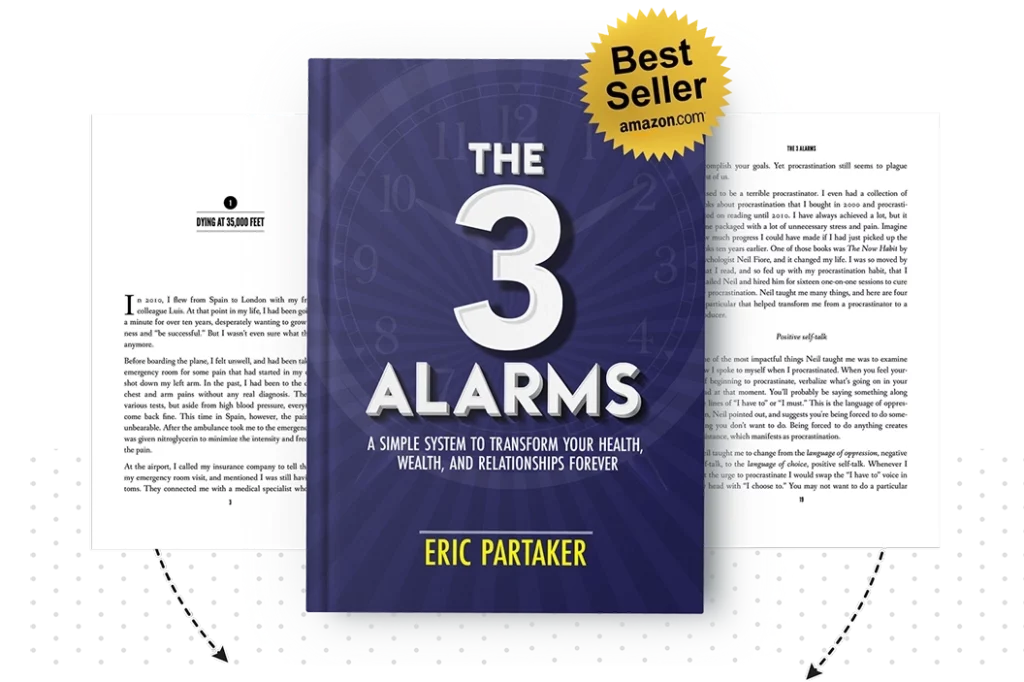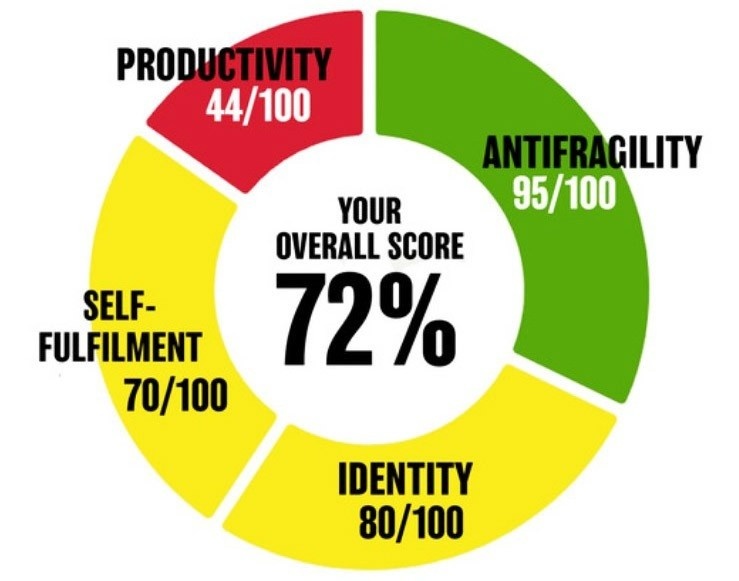SUMMARY
- Today we’re going to be talking about focus, how you can up your game, how you can stay more focused so that you can get the things done that you know you need to be doing, or that you would like to be doing.
- So the number one thing that you can do to increase your ability to stay focused is set goals that inspire you. Who wants to be working on something that doesn’t inspire them, right?
- Number two, to help you stay focused is to create time in your schedule for whatever it is that you’d like to be focusing on.
- Number three thing that you can do is, decide the day before what you want to be focusing on. If you decide those things the day before, you’re able to start your day in a much more focused state, because you know what you’re going to be doing and when you’re going to be doing it.
- Number four, you should get plenty of sleep. Studies clearly show that if you don’t have the recommended eight hours of sleep, your ability to stay focused tremendously diminishes.
- Number five to help you stay focused: start your day with some exercise. When you spike your energy at the start of the day, it helps keep your energy higher throughout the day.
- The number six technique that I use to help with focus is called centering, or you can refer to it as meditation. Whatever works for you to get you into a more relaxed state. Because when you’re relaxed you will have the ability to stay focused for longer periods of time.
- Number seven technique that I use to help stay focused is to start my day creatively rather than reactively. I encourage you to start your day, at least for that first hour doing something creative.
- The eighth thing that you can do to help improve your ability to stay focused, is to take frequent breaks. When groups are put next to each other and one group has no break time at all, and the other group has frequent breaks throughout the day, the group with frequent breaks throughout the day, even though they’re working less total time, they actually have a higher output than the group that didn’t have breaks.
TRANSCRIPT
Your lack of focus will probably be your downfall, unless you take action and learn how to stay focused and get the things done that you want to get done. I mean, maybe you’re like me in the past where there were so many times when I got super frustrated or even angry, that I wasn’t able to stay focused in doing the things that were so important, that I knew were so critical to my success. I’d get so frustrated time and time again with my inability to stay focused. But the good news is that you can learn how to correct that. I did it, so can you. I’m looking forward to taking you through that today.
Hi, my name is Eric Partaker and I help entrepreneurs close that gap between wherever they are, and where they’d like to be, not just with their business, but also with their lives. So not just helping them scale-up on the business front, but also scale-up on the life front. Today we’re going to be talking about focus, how you can up your game, how you can stay more focused so that you can get the things done that you know you need to be doing, or that you would like to be doing. Because look, the truth is, you have a window of opportunity to change the entire trajectory of your life. Whether that’s going to be positive or negative or stay flat, it will be linked back to your ability to stay focused on what matters most.
Now, this is a personal favorite subject of mine. I used to be horrible at being able to maintain focus. I would start working on something and I’d get distracted to a million different things. Yeah, it would just take, frankly, forever to get anything done. All of my achievement came with a lot of pain, a lot of hardship, a lot of frustration. There were so many times where I would look in the mirror and think, “Oh gosh!” I thought I’d be further ahead than I was at the moment at that point in time. But I overcame all of this. I learned how to become and stay more focused on what matters most, and you can learn too.
You might be thinking, “Yeah, but I don’t have it in me. I’ve tried so many times, and I just can’t stay focused on what matters most.” But that’s garbage. I’ve done it. Loads of people have done it, and it’s all learnable. Today we’re going to be taking you through a handful of techniques that you could be using to increase your ability to stay focused. So listen, and make sure you stick around for the whole message so that you can benefit from all of these techniques and methods.
So the number one thing that you can do to increase your ability to stay focused is set goals that inspire you. Who wants to be working on something that doesn’t inspire them, right? So if you really want to increase your ability to stay focused, set goals that inspire you. Now, I need to caveat this because sometimes when we need to stay focused, it’s not something that inspires us, but we still need to stay focused. There’s a little hack that you can use in these instances when you absolutely have no choice, you have to get something done, you have to stay focused, but you don’t want to do it. That’s by just using the language of choice. Tell yourself that you choose to do it, rather than you need to do it. Because if you’re in control, if you’re expressing that agency, “I choose to do something”, then you’ll have a much better chance of sticking with it.
But in all the other instances, when you have the chance to design goals for yourself, design goals that will inspire you. Make sure that we’re setting clear goals with deadlines that are broken down so that we know what needs to be achieved by when. Number two, to help you stay focused is to create time in your schedule for whatever it is that you’d like to be focusing on. Very often we don’t set goals to begin with, but sometimes when we set the goals, we actually don’t even have any time, any space built in our calendar for us to be working on those goals. I literally mean scheduling something in your calendar from 9:00 AM to 11:00 AM every day, whatever it’s going to be, an appointment with yourself where you’re going to be working on these goals. Whatever it is that’s most important for you. You must schedule time in your calendar for you to be focused. You need the container, the space for you to step into so that you can express that focus, apply that focus, to whatever it is that you’re working on.
Number three thing that you can do is, decide the day before what you want to be focusing on. When we decide the morning of a particular day, whatever it is that we want to be working on, often we can get caught up in the activities of the day. We never get around to perhaps scheduling our day properly. The days off and running, and we lose our ability to focus right from the start. But if instead, if the day before, as you end a day, if you’re deciding “What are the top three things I want to work on tomorrow? And when will I be doing those things?” If you decide those things the day before, you’re able to start your day in a much more focused state, because you know what you’re going to be doing and when you’re going to be doing it. So to improve your ability to stay focused, once again, decide what you’re going to be doing and focusing on the day before, rather than the morning of.
Number four, you can get plenty… Or not, “You can”, you should get plenty of sleep. Studies clearly show that if you don’t have the recommended eight hours of sleep, your ability to stay focused, tremendously diminishes. I mean, by an order of magnitude, it’s a massive difference in somebody’s ability to stay focused, if they have eight hours of sleep, for example, versus six hours or five hours. So make sure you’re getting a full night’s sleep. One great little hack that you can do here as well is introducing something called the digital sunset. This is just simply all electronics go off an hour before you go to bed such that you can get a full eight hours of sleep. Why turn electronics off the hour before bed? Because if not the lower your brains melatonin production by up to 50%. Why is that important? Because melatonin is a sleep inducing hormone, without enough melatonin, we won’t sleep a full eight hours. If you don’t sleep a full eight hours, you have no chance, or a much lower chance of staying focused on whatever matters most.
Number five to help you stay focused, and you might not have thought of this as a focus strategy, but start your day with some exercise. When you spike your energy at the start of the day, it helps keep your energy higher throughout the day. Why is that important? Well, because you know how it is. If you’re starting to get tired or a little bit exhausted, and what happens? You start to check out of your work, right? Suddenly you’re on social media, or looking at something random in the news. Usually that’s linked to us starting to get fatigued, or bored with whatever we’re working on and that’s linked to us not having enough energy.
So one of the simplest things that you can do to combat this is make sure that you spike your energy at the start of the day with some exercise. When we do that, we literally spike our energy, so that it’s declining because it’s naturally in a state of decline from when we wake up until when we fall asleep. But you’re making it start at a much higher point. So the decline is it’s a much longer journey, essentially. So you’re less likely to get so fatigued. So early on in the day, which once again, will improve your ability to stay focused.
The number six technique that I use to help with focus is called centering, or you can refer to it as meditation. I just do this at the start of my day and before any period of time where I really want to work with intense concentration or focus. I don’t do anything complicated here, I just do a set of deep breaths. You could repeat a word to yourself, for example like, “Relax.” You’re just breathing in through the nose, out through the mouth and 15 breaths, 20 breaths.
Whatever works for you to get you into a more relaxed state. Because when you’re relaxed, when your mind is more calm, when you’re less anxious, then you will have the ability to stay focused for longer periods of time. When the mind is quiet, the mind can focus. If the mind is all over the place, and you’re thinking about a million different things, and you’re anxious about whatever, family or friends coming over later for dinner, or a project that you’re trying to deliver on time that’s due later in the day. If you have a lot of competing thoughts, a lot of thoughts competing for your attention, it really makes it hard to focus on one thing at the moment.
Number seven technique that I use to help stay focused is to start my day creatively rather than reactively. The worst thing that you can do for your focus is to start your day in your inbox on social media, on the news. Because you’re basically just reacting to everyone else’s stories, everyone else’s information. You’re just being bounced around from their agendas rather than deciding what is it that you’re going to work on to further your agenda. So I encourage you to start your day, at least for that first hour doing something creative. What could that be? That could be one of the top three things for example, that you decided to work on the night before.
The eighth thing that you can do to help improve your ability to stay focused, is to take frequent breaks. We have to recognize that sitting in a chair, for example, for long periods of time, it is draining, it’s exhausting. It’s not the most exciting thing to be doing. What happens? Your energy starts to wane and starts to decline quite quickly. The more you stay seated for longer, the more quickly that energy decline happens. When your energy declines, then your ability to stay focused, goes and declines with it. So while we do that spike at the start of the day with some morning exercise, we can also do that throughout the day. So what I recommend you do is 50 minutes is a great amount of time to work before you get up and move around, have a glass of water, go talk to a colleague or get a breath of fresh air. But just move around and make sure that you’re moving around every 50 minutes. You could have 50 minutes and a 10 minute break.
I know you might think, “Wow, that sounds like a lot of break time.” But when groups are put next to each other and one group has no break time at all, and the other group has frequent breaks throughout the day, the group with frequent breaks throughout the day, even though they’re working less total time, they actually have a higher output than the group that didn’t have breaks. Why? Because they were able to stay focused. They were taking a break from the work, which the result of which reenergize them. Then allow them when they came back to whatever they’re working on to do that in a more focused state once again. So I hope you’ve enjoyed that. And if you head over to my website at ericpartaker.com, you’ll also be able to subscribe to my weekly insights newsletter.




